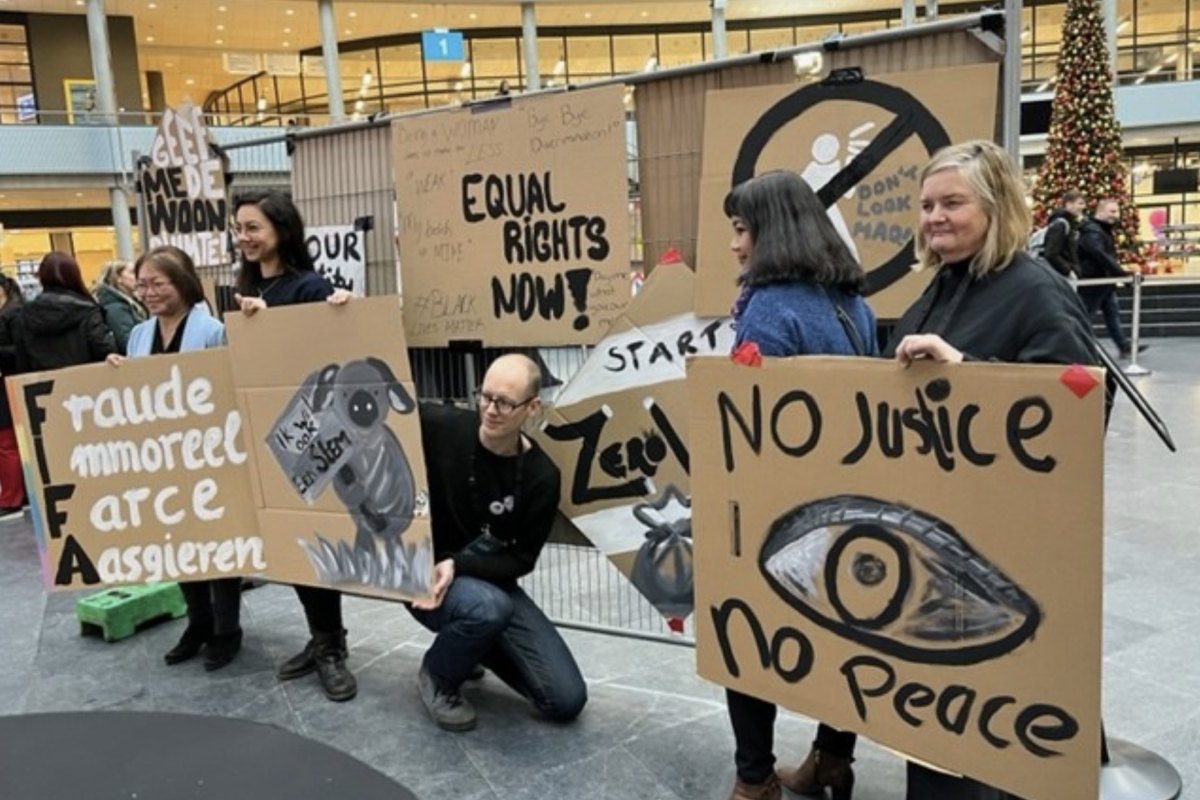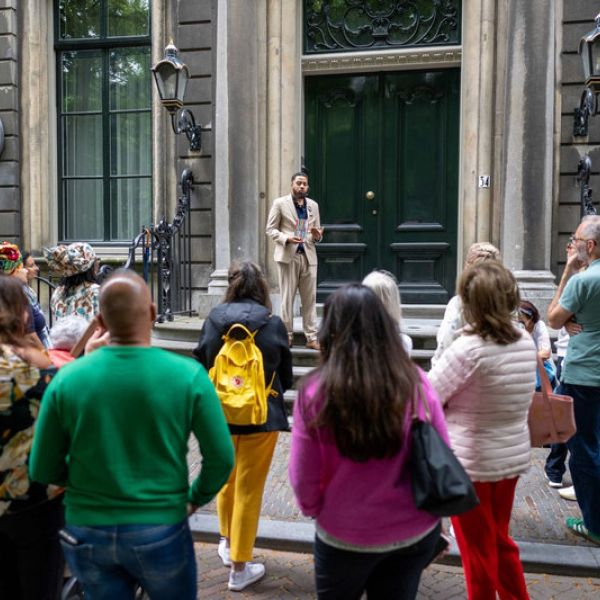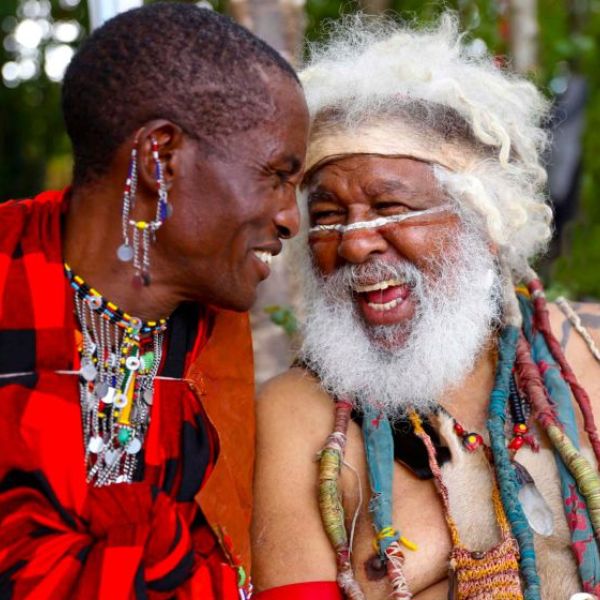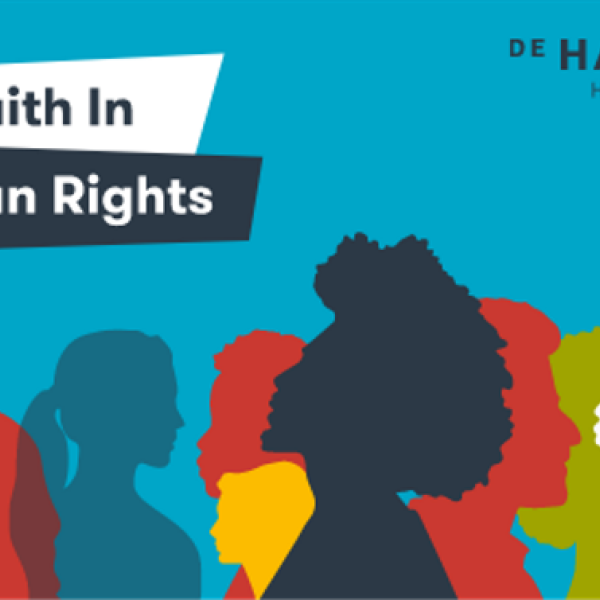‘I am still a human rights believer’
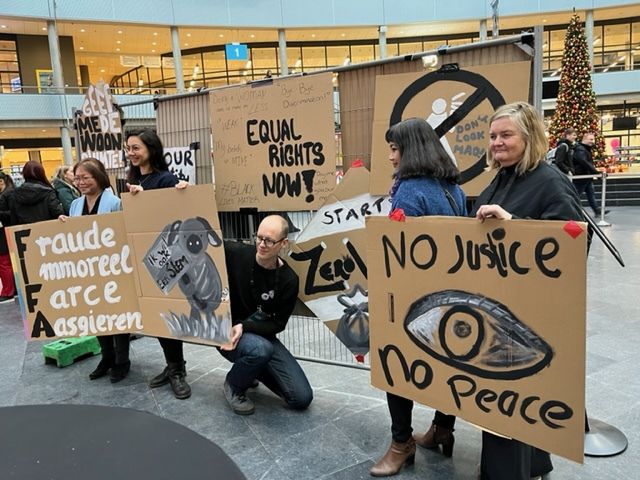
By Willem Jansen. Translated by Shereen Siwpersad.
The Human Rights Festival on 8 December 2022 at The Hague University marked a significant moment in Faith in Human Rights, an initiative by Initiatives of Change Netherlands (IofC). During this special celebration, about 150 participants gathered in the main hall of the university, where students from various disciplines and human rights experts gave dazzling presentations about their local human rights research. Other students advocated for human rights with workshops, posters, protest signs, and information booths.
Human Rights, Spoken Words
August de Bats, student and spoken word artist, kicked off the festival with a moving performance. Earlier that year, he participated in IofC’s mapping project, during which engaged students researched The Hague’s human rights culture, sometimes from very a personal perspective. Together with his fellow students, August, who has Indonesian roots, made a compelling documentary, making a case for raising more awareness about the Dutch colonial era in Indonesia by improving Dutch textbooks.
At the festival, August brought the issue of human rights close to home, reflecting on how difficult it can be to believe in human rights in a world at war, where human rights are often violated. And yet he ended on a hopeful note, pointing to the Universal Declaration of Human Rights as a source for guidance. ‘Maybe that Declaration won't save the world, but maybe we should try. It's about believing in human rights, isn't it?’
In a video message, Jan van Zanen, mayor of The Hague, added to August’s message by emphasizing that human rights are about the right to dignity and peace and that everyone has a role to play in safeguarding human rights. ‘Human rights are at stake, far away, but also here. You too can contribute by helping the people in your neighborhood, in your life’, Van Zanen said.
Human rights under your skin
Following the mayor’s message, the festival premiered a documentary on the right to beauty and beauty privilege. In this documentary, three dermatology students, by assignment of IofC, investigated whether beauty should be a right. During a series of street interviews, the people of The Hague expressed that they see beauty as an inner source. It’s not about whether you have smooth skin or a symmetrical face, but about radiating self-acceptance and self-love, they said.
So where do human rights come into play? As the students found, being beautiful increases your chances on the job and marriage market, which in turn affects your sense of well-being. Though these arguments are compelling, the effects of a lack of beauty on your mental health are hard to prove, and therefore the right to beauty and happiness cannot be claimed, the experts in the documentary concluded.
All in all, the documentary showcased the complexities of human rights from a unique and cutting-edge perspective. The students were delighted with the opportunity to conduct and present their research in the context of their studies. ‘It shows that dermatology is not shallow and frivolous, but important to the wellbeing of people.’
The right to adequate housing
The housing crisis in the Netherlands, which mainly affects students and young adults, was also addressed. Said El Rhandour, who wrote his final thesis on the universal right to adequate housing, delivered a heartfelt written plea to councilor Mariëlle Vavier. In his own neighborhood, he observed the effects of the housing crisis, seeing how his neighbors were forced to hold off on having children due to a lack of living space.
In his letter, Said thanked the municipality of The Hague for its efforts, whilst concurrently asking it to safeguard the right to adequate housing. Vavier responded that the city is working hard to solve the problem, but that its current policy does, indeed, not suffice. The municipality needs to reach out to its citizens, students included, to inform them of their rights, she said.
Who has faith in human rights?
With that question, Daphina Misiedjan, assistant professor at the Institute of Social Studies, challenged her audience during her invigorating talk on the relevance of human rights. According to Misiedjan, basic values such as respect and safety underlie human rights. Though the state is responsible for safeguarding these rights, it is our job to intervene and hold the state accountable when these rights are compromised, Misiedjan said. In the Netherlands, we have seen such a (controversial) intervention in the 80s during the so-called Amsterdam coronation riots. On the day of the accession of Queen Beatrix, angry citizens protested the city’s shortage of housing, rallying under the slogan ‘No house, no coronation.’
A student from the audience asked Misiedjan how we should deal with people who do not believe in human rights. She replied that we should ‘translate human rights into everyday language, in a way that relates to our experience, so that we can claim these rights ourselves. After all, not everyone has access to expensive lawyers.’ Take for example the basic human right of access to drinkable water. Authorities may have the right to cut off people who do not pay their water bills on time. But how does the government deal with entire families who are at risk of being evicted from their homes? And how do these regular citizens gain the resources to fight these powerful authorities?
‘Don’t underestimate the soft powers’
When it comes to safeguarding human rights, we should also appeal to our imagination, passion, and creativity, according to guest speakers Kathleen Ferrier, chairwoman of UNESCO Netherlands, and Arend Hardorff, board member of the university. ‘Human rights are a mindset. Never underestimate the soft powers, that is, our commitment to human rights. We all seek peace in our interpersonal relationships, in our schools, in our homes.’
In addition to the soft powers, we should also appeal to our creativity, Hardorff added. He expressed that he was particularly impressed by the students’ creativity, who gathered attention for human rights through making and participating in art, filmmaking, music, theatre, and workshops. Through these creative approaches, the students showcased their commitment to human rights, addressing issues such as LBGTQ+ rights, internship discrimination, and the right to food.
In a cooking workshop, led by Nutrition students, the right to adequate food was addressed in a particularly engaging way. The participants were invited to write a healthy meal plan with a limited budget and few ingredients: to them a fun exercise, but a harsh reality for many people living in The Hague. Perhaps, the students wondered, human rights begin and end with food, because what good are human rights on an empty stomach? After all, when your right to food is comprised, it becomes very difficult to claim other human rights. For people who rely on food banks, the students found, the right to food is ultimately about the values that underpin human rights: human dignity and mutual respect.
‘I am still a human rights believer’
The festival concluded with sustainable bites and an open exhibition, showcasing a poster collection and information booths of various peace and human rights organizations. All in all, The Hague University has contributed beautifully to IofC’s Faith in Human Rights project: by producing a very rich and dynamic program and working steadily towards an internal human rights culture together with its talented and knowledgeable students and experts. In times of war and other crises, there is a lot of cynicism toward the concept of human rights. Still, there’s reason for optimism. As a student said that day: ‘I am still a human rights believer’.
Note: The festival l is part of the three-year program Faith in Human Rights by Initiatives of Change Netherlands.
